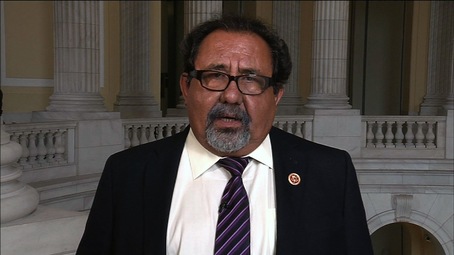US Congressman Trent Franks has asked for his HR 308 to be placed on the House’s suspension calendar. U.S. Rep. Raúl Grijalva (pictured) is trying to stop him. Known as the “Keep the Promise Act” the bill would make it impossible for the Tohono O’odham Nation to open their Desert Diamond West Valley casino at Glendale until 2027 at the earliest. The maneuver is usually used to get noncontroversial “earmarks” like the naming of libraries or post offices included in a busy congressional schedule. But in this case it seems to be being used to accomplish a political agenda.
A motion to suspend the House rules will require two thirds of members present to approve. A non-roll call vote with no debate could occur as early as Monday leaving no public record of who voted to pass the bill.
A lawsuit is now pending which would determine whether the tribe can operate Class II bingo games on their reservation land in trust, or be able to offer full casino gaming such as roulette and craps. Regardless of the judge’s ruling in that case, the tribe could open some kind of casino. The property is nearly completed in anticipation of a December opening. Franks’ bill would put a stop to the operation of any sort of casino there.
It would not be the first time that repeated failure in the courts and the inability to pass a controversial gambling matter has been slipped in during the dark of night. A small handful of politicians added the Unlawful Internet Gambling Enforcement Act of 2006 (UIGEA) onto a must-pass Homeland Security bill in 2005 crippling legal online gambling in the US, removing any hope of consumer protections, and giving rise to whole new industries overseas.
U.S. Rep. Raúl Grijalva of Southern Arizona doesn’t want to see the “politicraft” succeed, and wrote House Majority Leader Kevin McCarthy saying, “This precedent-making legislation has no business on the suspension calendar.”
“Suspension of the rules is for noncontroversial legislation that doesn’t cost taxpayers money,” Grijalva added. “This bill is both controversial and expensive.”
Some estimates have placed an eventual price tag of $1 billion on the nation’s budget if HR 308 passes and the tribe wins federal lawsuits they are sure to bring. Grijalva is quoted in tucson.com as saying, “The Republican delegation in Arizona is quick to want to curtail Medicaid, Medicare, quick to cancel a transportation bill because of cost,” he stated. “And here they have no qualms about a sweetheart deal,” which would benefit other tribes opposed to the competition a Glendale casino would bring to their enterprises.
Since the casino was proposed in 2009 other area tribes have been hard at work to derail the Tohono O’odham’s plans. Between 2009 and this time last year the Gila River Indian Community spent $11 million in federal lobbying and the Salt River Pima-Maricopa Indian Community had spent over $2 million. The state has also invested millions in lawsuits attempting to stop the casino. At almost every turn the Tohono O’odham have prevailed in federal court and through opinions and administrative actions at the Department of Interior.



